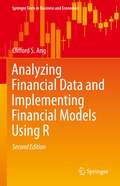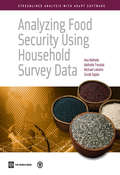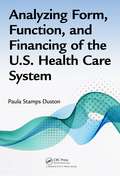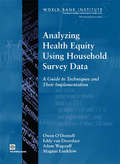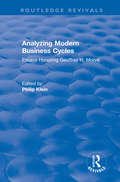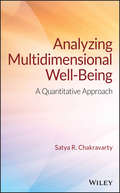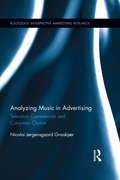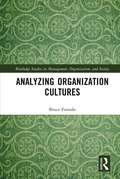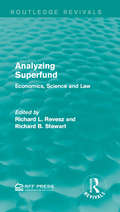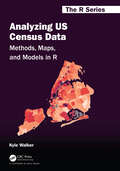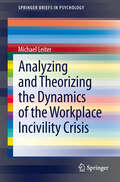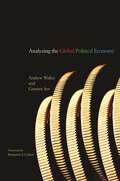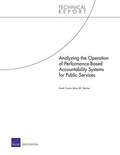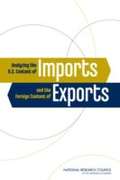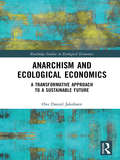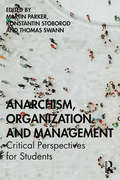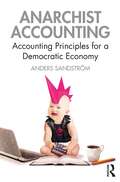- Table View
- List View
Analyzing Financial Data and Implementing Financial Models Using R (Springer Texts in Business and Economics)
by Clifford S. AngThis advanced undergraduate/graduate textbook teaches students in finance and economics how to use R to analyse financial data and implement financial models. It demonstrates how to take publically available data and manipulate, implement models and generate outputs typical for particular analyses. A wide spectrum of timely and practical issues in financial modelling are covered including return and risk measurement, portfolio management, option pricing and fixed income analysis. This new edition updates and expands upon the existing material providing updated examples and new chapters on equities, simulation and trading strategies, including machine learnings techniques. Select data sets are available online.
Analyzing Fiscal Space Using the MAMS Model: An Application to Burkina Faso
by Jan Gottschalk Vu Manh Le Hans Lofgren Kofi NouveA report from the International Monetary Fund.
Analyzing Food Security Using Household Survey Data
by Zurab Sajaia Michael Lokshin Nathalie Troubat Ana MoltedoSince the end of the Second World War, the international community has been focusing on reducing the number and the proportion of people who suffer from hunger. Over time it became clear that no single indicator would provide a comprehensive picture of the food security situation. Rather, a suite of indicators is necessary to describe food insecurity in all its dimensions. The demand for evidence-based policies, which brings together providers such as statistical offices and users of food security indicators including policy makers and researchers, has also been increasing. The stand-alone software, ADePT-Food Security Module (available for free downloading), was developed to produce food security indicators from food consumption data collected in household surveys. These indicators, derived at the national and subnational levels, include the consumption of calories and macronutrients, the availability of micronutrients and amino acids, the distribution of calories and the proportion of people undernourished. The book focuses on the theory, methodology, and analysis of these indicators. It has five chapters beginning with a brief overview on concepts of food security. The theory and methodology are further described in the following chapter. To help users with the interpretation of the results some examples are given in chapter 3. Chapter 4 of the book provides guidelines for the preparation of the input datasets. Finally, chapter 5 explains how to use the software. Both the software and this book are products of decades of experience in analyzing food security. This project was made possible through collaboration between FAO and the World Bank, with financial support from the European Union.
Analyzing Form, Function, and Financing of the U.S. Health Care System
by Paula Stamps DustonAnalyzing Form, Function, and Financing of the U.S. Health Care System tells the story of the U.S. health care system by using a narrative approach identifying function rather than the more common data-driven focus on structure. It presents policy decisions we have made about our health care system and analyzes some of their consequences to better
Analyzing Global Environmental Issues: Theoretical and Experimental Applications and their Policy Implications (Routledge Explorations in Environmental Economics #39)
by Ariel Dinar Amnon RapoportThe existence of environmental dilemmas and political conflicts leads us to appreciate the need for individuals and groups to behave strategically in order to achieve their goals and maintain their wellbeing. Global issues such as climate change, resource depletion, and pollution, as well as revolts and protests against corporations, regimes, and other central authorities, are the result of increased levels of externalities among individuals and nations. These all require policy intervention at international and global levels. This book includes chapters by experts proposing game theoretical solutions and applying experimental design to a variety of social issues related to global and international conflicts over natural resources and the environment. The focus of the book is on applications that have policy implications, relevance and, consequently, could lead to the establishment of policy dialogue. The chapters in the book address issues that are global in nature, such as international environmental agreements over climate change, international water management, common pool resources, public goods, international fisheries, international trade, and collective action, protest, and revolt. The book’s main objective is to illustrate the usefulness of game theory and experimental economics in policy making at multiple levels and for various aspects related to global and international issues. The subject area of this book is already widely taught and researched, but it continues to gain popularity, given growing recognition that the environment and natural resources have become more strategic in human behavior.
Analyzing Health Equity Using Household Survey Data: A Guide to Techniques and Their Implementation
by Owen O'Donnell Adam Wagstaff Magnus LindelowHave gaps in health outcomes between the poor and better off grown? Are they larger in one country than another? Are health sector subsidies more equally distributed in some countries than others? Are health care payments more progressive in one health care financing system than another? What are catastrophic payments and how can they be measured? How far do health care payments impoverish households? Answering questions such as these requires quantitative analysis. This in turn depends on a clear understanding of how to measure key variables in the analysis, such as health outcomes, health expenditures, need, and living standards. It also requires set quantitative methods for measuring inequality and inequity, progressivity, catastrophic expenditures, poverty impact, and so on. This book provides an overview of the key issues that arise in the measurement of health variables and living standards, outlines and explains essential tools and methods for distributional analysis, and, using worked examples, shows how these tools and methods can be applied in the health sector. The book seeks to provide the reader with both a solid grasp of the principles underpinning distributional analysis, while at the same time offering hands-on guidance on how to move from principles to practice.
Analyzing Information on Women-Owned Small Businesses in Federal Contracting
by National Research Council of the National AcademiesThe National Academies Press (NAP)--publisher for the National Academies--publishes more than 200 books a year offering the most authoritative views, definitive information, and groundbreaking recommendations on a wide range of topics in science, engineering, and health. Our books are unique in that they are authored by the nation's leading experts in every scientific field.
Analyzing Modern Business Cycles: Essays Honoring
by Philip A KleinThis title was first published in 1990.
Analyzing Multidimensional Well-Being: A Quantitative Approach
by Satya R. Chakravarty“An indispensable reference for all researchers interested in the measurement of social welfare. . .” —François Bourguignon, Emeritus Professor at Paris School of Economics, Former Chief Economist of the World Bank. “. . .a detailed, insightful, and pedagogical presentation of the theoretical grounds of multidimensional well-being, inequality, and poverty measurement. Any student, researcher, and practitioner interested in the multidimensional approach should begin their journey into such a fascinating theme with this wonderful book.” —François Maniquet, Professor, Catholic University of Louvain, Belgium. A Review of the Multidimensional Approaches to the Measurement of Welfare, Inequality, and Poverty Analyzing Multidimensional Well-Being: A Quantitative Approach offers a comprehensive approach to the measurement of well-being that includes characteristics such as income, health, literacy, and housing. The author presents a systematic comparison of the alternative approaches to the measurement of multidimensional welfare, inequality, poverty, and vulnerability. The text contains real-life applications of some multidimensional aggregations (most of which have been designed by international organizations such as the United Nations Development Program and the Organization for Economic Co-operation and Development) that help to judge the performance of a country in the various dimensions of well-being. The text offers an evaluation of how well a society is doing with respect to achievements of all the individuals in the dimensions considered and clearly investigates how achievements in the dimensions can be evaluated from different perspectives. The author includes a detailed scrutiny of alternative techniques for setting weights to individual dimensional metrics and offers an extensive analysis into both the descriptive and welfare theoretical approaches to the concerned multi-attribute measurement and related issues. This important resource: • Contains a synthesis of multidimensional welfare, inequality, poverty, and vulnerability analysis • Examines aggregations of achievement levels in the concerned dimensions of well-being from various standpoints • Shows how to measure poverty using panel data instead of restricting attention to a single period and when we have imprecise information on dimensional achievements • Argues that multidimensional analysis is intrinsically different from marginal distributions-based analysis Written for students, teachers, researchers, and scholars, Analyzing Multidimensional Well-Being: A Quantitative Approach puts the focus on various approaches to the measurementof the many aspects of well-being and quality of life. Satya R. Chakravarty is a Professor of Economics at the Indian Statistical Institute, Kolkata, India. He is an Editor of Social Choice and Welfare and a member of the Editorial Board of Journal of Economic Inequality.
Analyzing Music in Advertising: Television Commercials and Consumer Choice (Routledge Interpretive Marketing Research)
by Nicolai GraakjaerThe study of music in commercials is well-suited for exploring the persuasive impact that music has beyond the ability to entertain, edify, and purify its audience. This book focuses on music in commercials from an interpretive text analytical perspective, answering hitherto neglected questions: What characterizes music in commercials compared to other commercial music and other music on TV? How does music in commercials relate to music ‘outside’ the universe of commercials? How and what can music in commercials signify? Author Nicolai Graakjær sets a new benchmark for the international scholarly study of music on television and its pervading influence on consumer choice.
Analyzing New Venture Opportunities
by Michael J. RobertsThe note describes a systematic process for framing and researching the issues that should be analyzed in the course of considering a new venture idea.
Analyzing Organization Cultures (Routledge Studies in Management, Organizations and Society)
by Bruce FortadoCertain consultants argue leaders can quickly, easily, and considerably alter their organization cultures to improve performance. Conversely, field researchers have described situations where leaders could do little to alter the existing organization culture. Between these extreme positions, a spectrum of varying degrees of leader influence exists, and organizations fall at various places along this spectrum. This book presents five field studies dealing with team, service, and sales cultures where both expected and unexpected outcomes arose. In multiple instances, leaders hoped showing some employee appreciation would compensate for offering below market average wages. Several leadership groups were prospering based on cost cuts or increased sales. Those below often had their work intensified and they were experiencing greater stress. Eight paradoxical situations were uncovered and the interpretations of the participants were based in part on their personal work histories and the history of their current organization. In each case, evidence of employee informal organization and managerial operating cultures were documented. Analyzing Organization Cultures uses detailed case studies of five work organizations to offer a comparative approach to analyzing organizational culture. It shows the latest state of knowledge on the topic and will be of interest to researchers, academics, and students in the fields of organizational studies, management history, human resource management, and organizational theory.
Analyzing Performance Problems: Or You Really Oughta Wanna
by Robert F. Mager Peter PipeAnalyzing Performance Problems gives you a step-by-step process for solving virtually any performance problem you face. Instead of guessing at solutions that won't work, you can save time, money, and frustration by finding the true cause of the problem and identifying the best and most economical way to solve it.
Analyzing Relative Costs
by Jan W. Rivkin Hanna HalaburdaIntroduces students to the technique of relative cost analysis, a core technique of strategists. Among the intricate quantitative analyses that strategists undertake, relative cost analysis may be the most common. The goal of a relative cost analysis is simply to estimate how a company's costs compare to a rival's. Companies examine relative costs for a host of reasons: to anticipate how a rival is likely to react to a price change; to predict how a price war may evolve; to test whether a cost advantage it believes it has is real and sustainable; to decide how low a company must bid in order to win a competitive contract from a rival; to identify opportunities for internal cost reduction; to estimate, in the context of an acquisition, how much the costs of an acquired company might be reduced and what a reasonable price might be for the company; and so forth.
Analyzing Superfund: Economics, Science and Law (Routledge Revivals)
by Richard B. Stewart Richard L. ReveszOriginally published in 1995, Analyzing Superfund outlines the key issues of the superfund reauthorization debate in the United States. The Superfund law faced criticism for being wasteful, inefficient and expensive. These papers sought to shed light on this argument in relation to clean-up standards, the liability regime, transaction costs and natural resource damage. This title will be of interest to students of Environmental Studies and professionals
Analyzing US Census Data: Methods, Maps, and Models in R (Chapman & Hall/CRC The R Series)
by Kyle WalkerCensus data are widely used by practitioners to understand demographic change, allocate resources, address inequalities, and make sound business decisions. Until recently, projects using US Census data have required proficiency with multiple web interfaces and software platforms to prepare, map, and present data products. This book introduces readers to tools in the R programming language for accessing and analyzing Census data, helping analysts manage these types of projects in a single computing environment. Chapters in this book cover the following key topics: • Rapidly acquiring data from the decennial US Census and American Community Survey using R, then analyzing these datasets using tidyverse tools; • Visualizing US Census data with a wide range of methods including charts in ggplot2 as well as both static and interactive maps; • Using R as a geographic information system (GIS) to manage, analyze, and model spatial demographic data from the US Census; • Working with and modeling individual-level microdata from the American Community Survey’s PUMS datasets; • Applying these tools and workflows to the analysis of historical Census data, other US government datasets, and international Census data from countries like Canada, Brazil, Kenya, and Mexico. Kyle Walker is an associate professor of geography at Texas Christian University, director of TCU’s Center for Urban Studies, and a spatial data science consultant. His research focuses on demographic trends in the United States, demographic data visualization, and software tools for open spatial data science. He is the lead author of a number of R packages including tigris, tidycensus, and mapboxapi.
Analyzing Work Groups
by Linda A. Hill Michel AntebyWork groups are the building blocks of organizations. They are found in all areas of an organization, from research and development to customer service, and at all levels, from the executive suite to the factory floor. Some are incredibly successful, while others are dismal failures. Team work is hard work, and all too often groups do not live up to their potential. Provides a framework for analyzing work groups so that group leaders and members can identify actions that will enhance their effectiveness. Helps provide insight into the factors most profoundly shaping the development, dynamics, and effectiveness of task-performing groups and, in particular, group culture, its antecedents, and consequences. To illustrate how the framework is used, it looks at and analyzes an actual work group: the new product team of the Merit Corporation. Examines the impact of leadership style on group culture and outcomes and describes how one leader's individual style can affect the way teams operate and perform.
Analyzing and Theorizing the Dynamics of the Workplace Incivility Crisis (SpringerBriefs in Psychology #8)
by Michael LeiterContemporary worklife builds upon a foundation for teamwork among skilled and dedicated people. Despite the utility of supportive working relationships and despite extensive consulting activity on leadership and team building, employees complain extensively about mistreatment by their bosses and colleagues. Analyzing and Theorizing the Dynamics of the Workplace Incivility Crisis presents a theoretic framework for considering the fundamental issues of group dynamics and individual psychology that lie behind this ongoing workplace incivility crisis. It contextualizes the need for belonging as a motivation that shapes expressed social behaviour and intensifies received social behaviour. Looking at cognitive elements as well as rudeness rationales that pertain to workplace incivility and its justification, this work maps social constructs, including the role of team leadership, that lead to setting implicit social norms. In addition to formulating a theoretical framework, Analyzing and Theorizing the Dynamics of the Workplace Incivility Crisis considers methods to address the dynamics that perpetuate incivility at work and actively points at setting an action agenda to evaluate their impact.
Analyzing the Global Political Economy
by Andrew Walter Gautam SenIdeally suited to upper-undergraduate and graduate students, Analyzing the Global Political Economy critically assesses the convergence between IPE, comparative political economy, and economics. Andrew Walter and Gautam Sen show that a careful engagement with economics is essential for understanding both contemporary IPE and for analyzing the global political economy. The authors also argue that the deployment of more advanced economic theories should not detract from the continuing importance for IPE of key concepts from political science and international relations. IPE students with little or no background in economics will therefore find this book useful, and economics students interested in political economy will be alerted to the comparative strengths of political science and other social science disciplines. A concise look at the foundations of analysis in the political economy of global trade, money, finance, and investment Suitable for upper-undergraduate and graduate students with some or no economic background Techniques and findings from a range of academic disciplines, including international relations, political science, economics, sociology, and history Further reading and useful weblinks including a range of relevant data sources, listed in each chapter
Analyzing the Operation of Performance-Based Accountability Systems for Public Services
by Brian M. Stecher Frank CammThis report describes a framework used to organize available empirical information on one form of performance-based management, a performance-based accountability system (PBAS), which identifies individuals or organizations that must change their behavior to improve an activity's performance, an incentive structure to motivate those changes, and measures tailored to inform the incentive structure.
Analyzing the U.S. Content of Imports and the Foreign Content of Exports
by National Research Council of the National AcademiesThe National Academies Press (NAP)--publisher for the National Academies--publishes more than 200 books a year offering the most authoritative views, definitive information, and groundbreaking recommendations on a wide range of topics in science, engineering, and health. Our books are unique in that they are authored by the nation's leading experts in every scientific field.
Anarchism and Ecological Economics: A Transformative Approach to a Sustainable Future (Routledge Studies in Ecological Economics)
by Ove Daniel JakobsenAnarchism and Ecological Economics: A Transformative Approach to a Sustainable Future explores the idea that anarchism – aimed at creating a society where there is as much freedom in solidarity as possible – may provide an ideal political basis for the goals of ecological economics. It seems clear that it is going to be impossible to solve the problems connected to environmental degradation, climate change, economic crashes and increasing inequality, within the existing paradigm. The anarchist aims of reducing the disparities of rank and income in society and obtaining a high standard of living within environmentally sound ecosystems chime well with the ecological economists’ goal of living within our environmental limits for the betterment of the planet and society. The book refers to the UN’s sustainability development goals, and the goals expressed in the Earth Charter, viewing them through an anarchist’s lens. It argues that in order to establish ecological economics as a radical new economy right for the 21st century, neoliberal economics needs to be replaced. By connecting ecological economics to a solid philosophical tradition such as anarchism, it will be easier for ecological economics to become a far more potent alternative to “green” economic thinking, which is based on, and supports, the dominant political regime. Innovative and challenging, this book will appeal to students and scholars interested in economics and the politics surrounding it.
Anarchism, Organization and Management: Critical Perspectives for Students
by Martin Parker; Konstantin Stoborod; Thomas SwannYou might think that anarchism and management are opposed, but this book shows how engaging with the long history of anarchist ideas allows us to understand the problems of contemporary organizing much more clearly. Anarchism is a theory of organizing, and in times when global capitalism is in question, we need new ideas more than ever. The reader of this book will learn how anarchist ideas are relevant to today’s management problems. In a series of student-friendly short chapters on contemporary topics, the authors challenge the common sense that has allowed particular forms of organization and market to become globally dominant. Do we always need leaders? Is technological change always a good thing? Are markets the best way to arrange forms of exchange? This challenging book is essential for anyone who wants to understand what is wrong with business school theory and what we might do about it. For students and teachers of management, the standard textbook reproduces the dominant ideas about the way that business should be done. This book turns those ideas on their head, asking awkward questions about authority, technology and markets and demanding that its readers think hard about whether they want to reproduce those ideas too. Students of management, like everyone else, know that the current global system is broken but they don’t know what they can do about it. This unique book uses 200 years of anarchist ideas to give readers a clear guide for building the organizations and businesses of the future and places choice and responsibility at the centre of making a new world for people and the planet.
Anarchist Accounting: Accounting Principles for a Democratic Economy
by Anders SandströmThis book is about accounting in an alternative libertarian socialist economic system. It explores what information and transactions we need to enable democratic and effective financial decisions by those affected by the decisions. Based on the economic model, participatory economics, the author proposes a set of accounting principles for an economy comprised of common ownership of productive resources, worker and consumer councils, and democratic planning, promoting the model’s core values. The author tackles questions such as how accounting could be organised in an economy with no private equity owners or private lenders and creditors that is not based on greed and competition but instead on cooperation and solidarity. A large part of the book is focused on issues regarding investments; thus, he asks how and on what basis decisions are made about the allocation of an economy’s production between consumption today and investments that enable more consumption in the future, and how investments are accounted for. He also considers how investments in capital assets and production facilities would be decided, financed, and valued if they are not owned by private capital owners and if allocation does not take place through markets but through a form of democratic planning. In answering these questions and more, the author demonstrates that alternative economic systems are indeed possible, and not merely lofty utopias that cannot be put into practice, and inspires further discussion about economic vision. By applying accounting to a new economic setting and offering both technical information and the author’s bold vision, this book is a comprehensive and valuable supplementary text for courses touching on critical accounting theory. It will also appeal to readers interested in alternative kinds of economies.
Anasazi: Exclusive Salon Products, Inc.
by William A. Sahlman Jason GreenAnasazi, a hair-care products start-up based in the Midwest, is having growing pains as it tries to develop a new distribution model for the professional hair salon industry. The company has completed several rounds of venture financing but, to continue, needs to raise more capital earlier than expected. It goes through a process of refining and refocusing its strategy to raise the new funds.
